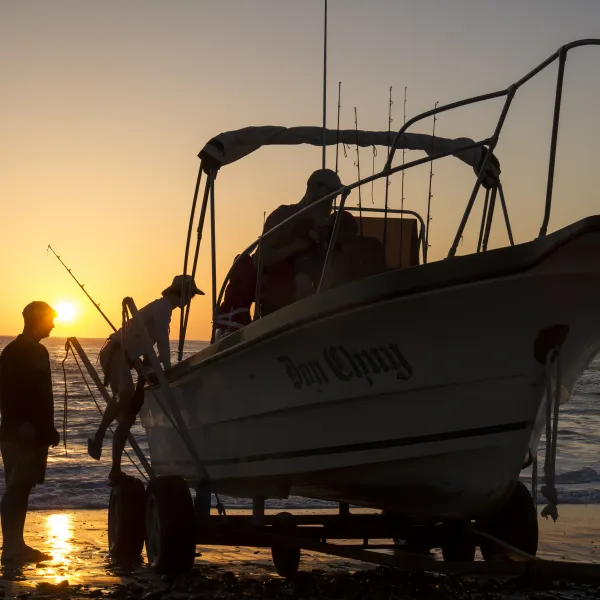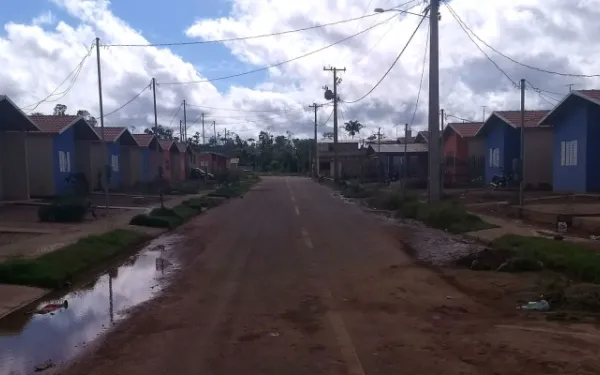
Project
Photo: Carlos AguileraProtecting the rich marine life of Cabo Pulmo Reef
Cabo Pulmo Reef, a 20,000-year-old ecological treasure in Baja California Sur, Mexico, hosts many of the 800 marine species in the Sea of Cortez.
Overfishing almost killed it in the 1980s. But the Mexican government intervened in 1995 to declare it a national park. Since then, the reef has grown, and the surrounding ecosystem has prospered.
Developers repeatedly try to build enormous tourist resorts at Cabo Pulmo. The proposed resorts typically include tens of thousands of hotel rooms, golf courses, an airport, sports clubs, and more—and require new housing development for thousands of employees.
Coral reefs like Cabo Pulmo are extremely vulnerable to the impacts of such poorly planned development. Sewage and wastewater runoff cause a surge in the growth of algae that blocks sunlight, causing the reef to bleach and die.
Fertilizers, herbicides, and pesticides from golf courses contaminate ocean currents and upset the delicate ecological balance of the area. Boating, fishing, and diving stress and break reefs, too.
In an area where water is scarce, tourism infrastructure projects could overexploit aquifers that are already suffering the impacts of climate change.
AIDA's work has been instrumental in ensuring the survival and health of Cabo Pulmo's ecosystems. We continue monitoring the situation and working with national partners to make legal protections for the reef stronger and permanent.
Partners:

Related projects

Belo Monte: Hope remains, despite failed promises
When the Belo Monte Dam builders came to this corner of the Brazilian Amazon, they came with the promise of sustainable development, particularly for Altamira, the city closest to the dam. On a recent visit to that city, it was clear to me that—six years after construction began and one year after beginning operations—Belo Monte has brought anything but. Last June, Brazil’s Institute of Applied Economics classified Altamira as the most dangerous city in Brazil. According to the study, Altamira’s rapid and disorderly growth over the last six years has had serious implications for crime in the city. In 2000, according to the Brazilian Institute of Geography and Statistics, Altamira had about 77 thousand residents. With dam construction, that figure soared to 110 thousand last year. The result: Altamira registered the country’s highest homicide rate in 2015, with 105.2 murders per 100 thousand people. A troubling context frames these numbers: Brazil is the most dangerous country in the world for environmental defenders, according to Global Witness. That’s especially true for those who dedicate their lives to defending the Amazon—16 of Brazil’s 49 murders in 2016 were related to protection of the Amazon rainforest. Unsanitary conditions In addition to generalized violence, the other big worry in Altamira is basic sanitation, which involves sources and systems of clean water, as well as waste management. During the last six years, when the dam completely altered the urban and social dynamic of the city, no one bothered to provide an adequate, basic sanitation system. And that’s despite the fact that dam construction and operation were approved on condition of building such a system. The only thing built in Altamira at that time was the massive hydroelectric dam. In April of this year, a Brazilian court ordered the dam’s operations suspended until basic sanitation is adequately provided to the resettlement districts of Altamira. But the company in charge of the dam has refused to comply with the ruling, arguing that it has permission to operate. This clearly demonstrates the government’s inability to avoid the abuses caused by this mega-project and its operating company. Questionable investment The current reality of Belo Monte is aggravated by the fact that a Chinese state-owned company, Grid Brazil Holding, won the auction to take over the second power transmission system to be fed by the dam. The company offered 988 million reales (roughly $300 million USD), which makes me question the previous statements of the Brazilian government that hydroelectric energy is cheap, as well as clean. This investment is worrying because the company has already been fined several times for failing to meet deadlines related to the first power transmission system. Worse still, Chinese companies are known for failing to protect human rights and the environment, which is why the situation in Altamira is likely to become even more complicated. Hope remains Despite this discouraging panorama, the urban population, as well as the indigenous and riverside communities, still have hope that Altamira will one day be a quiet and beautiful city again. I heard many people speak of their desire to return to the days of sitting on chairs in the street talking with neighbors, and bathing in the waters of the Xingu river; the days of collective fishing and parties in the parks. Those people have shown me that we should not be afraid or lose hope. There are many who believe in my work as a defender of the Amazon. It is for them that I will keep fighting. I will work so that institutions, like the Inter-American Commission on Human Rights, before which our case is pending, hold Brazil accountable for the human rights violations that have occurred from the construction and operation of Belo Monte. And I will ensure that the people affected by Belo Monte get justice and reparations.
Read more
As killings increase, how can we defend the defenders?
Of the 87 human rights defenders murdered in Latin America in 2016, 60 were defending rights linked to environmental destruction. That’s according to a new report from Global Witness. Worldwide, at least 200 environmental defenders were killed in 2016, making it the most dangerous year for environmentalists on record. And 60 percent of these murders occurred in Latin America. Disturbingly, these statistics likely underrepresent the problem, as many killings of defenders and activists around the world go unreported. Environmental defenders are also frequently subjected to harassment, intimidation, death threats, arrests, sexual assault, kidnapping, and lawsuits intended to silence them. “The battle to protect the planet is rapidly intensifying and the cost can be counted in human lives,” Global Witness campaigner Ben Leather said. “More people in more countries are being left with no option but to take a stand against the theft of their land or the trashing of their environment. Too often they are brutally silenced by political and business elites, while the investors that bankroll them do nothing.” The roots of the problem Why are so many activists under threat, simply for speaking out and raising awareness about environmentally destructive projects? Governments argue that mining, oil and gas extraction, logging, and dams will boost their countries’ economy. But corporations typically hire outside contractors, creating few if any local jobs. And in many situations, development projects pollute the environment, displace entire communities, and infringe human rights. Some projects, like large hydroelectric dams, also hurt biodiversity and contribute to climate change. Furthermore, governments must often rely on transnational corporations or foreign investment to fund these projects. As a result, profits from mining, oil and gas, or large dams often benefit international corporations or a country’s most-wealthy businessmen, but are not always invested into local communities. This situation produces extreme rates of economic inequality. Honduras, for example, is one of the most unequal countries in Latin America and has had the highest per capita rate of killings of environmental defenders over the last decade. Twenty percent of the wealthiest people in Honduras reap 60 percent of the national income, leaving almost two-thirds of Hondurans to live in poverty or extreme poverty, according to the Organization of American States. When activists—many of them indigenous—speak out against these environmental and economic injustices, they’re often denounced as enemies of progress. Working together, governments and corporations try to silence outspoken defenders. When censorship is not enough, the military, police, and mercenaries are called to silence the opposition with escalating threats and violence. How to defend the defenders Each year, as the problem intensifies, we’re reminded of our duty to stand up for environmental and human rights defenders, and of the need to institute adequate policies for their protection. Here are several ways governments and citizens alike can protect defenders around the world: International Law. Governments around the world are party to international treaties and conventions that obligate them to uphold certain human rights standards. When these basic rights aren’t respected, it’s up to the international community to step in and protect activists under threat by pressuring governments to enforce the law. AIDA works in this way to hold governments accountable and encourage the immediate adoption of measures to guarantee the life and integrity of at-risk activists. “States must guarantee a favorable environment in which people can safely perform their work to protect the natural world,” AIDA attorney Astrid Puentes Riaño said. “States should also investigate these instances of violence. The murders of those who bravely defend the environment must not go unpunished.” Domestic Legislation. When international pressure doesn’t work, domestic laws can help pressure States into protecting activists who speak out. In the United States, for example, legislation has been proposed that would suspend US military and police aid to Honduras until the Honduran government investigates human rights violations in the country. The bill could help protect activists there and serve as an example for other countries that would like to follow suit. Emergency Measures. Emergency visa measures or diplomatic protections to remove endangered activists from harm can be useful in relocating activists across borders or protecting them in another way. Global Solidarity Campaigns. Solidarity campaigns organized by coalitions of human rights organizations and supported by the media hold great potential. If these outlets simultaneously, consistently, and reliably raised the alarm of an activist under threat, governments and corporations might think twice before trying to silence the person at risk. This, of course, involves you too. There’s no substitution for the mobilization of community support—in the streets, on social media, in your daily life. Standing up, speaking out and raising awareness is the first step toward building a more just future. These are just some of the solutions to this growing problem, and their success depends on all of us. Showing we’re not afraid to fight for environmental justice and a future that respects everyone’s human rights is not just a good idea, it’s necessary for our survival.
Read more
Important progress made towards ocean treaty
States meeting at the United Nations in New York took an important step towards launching negotiations for a new treaty to protect the biodiversity of the high seas (areas beyond the national jurisdiction). Making up two thirds of the global ocean, marine life in the high seas is not effectively protected. A new treaty will rectify this, putting in place measures to protect the rich and globally significant biodiversity and ecosystem services of the high seas and to govern activities undertaken there sustainably. Although the wording of the recommendation did not reflect the very strong support for rapid UN action towards a treaty, it will enable the General Assembly to convene an Intergovernmental Conference. The 35 member organisations of the High Seas Alliance which have campaigned for this treaty were pleased with the recommendation to move forwards. Peggy Kalas of the High Seas Alliance said: “This is a significant step for the high seas and humanity since we are all dependent on the ocean for a healthy planet. A new treaty will bring law and governance to this most neglected and besieged part of our world and we are closer to that goal now. We are profoundly thankful to the many, many states who have worked so hard to achieve this; their determination to protect the global commons for all humankind has been inspiring.” The decision of the Preparatory Committee will now go the UN General Assembly. The overwhelming majority of states are pushing for the next step to be an Intergovernmental Conference (IGC) convened in 2018. An IGC would mean formal negotiations on the text of a new treaty would commence. "Today marks a significant step forward for the world’s ocean," said Lisa Speer, Director of international Oceans at the Natural Resources Defense Council. Sylvia Earle said: “The nations of the world took important steps towards a treaty today. The high seas are half of the world and need the rule of law. To those who have worked so hard at the UN and in support of this moment, we extend an ocean of gratitude and carry forward optimism for a high seas treaty.” Veronica Frank of Greenpeace said: “Although we hoped to see a starting date included for the negotiating conference, it was good to see such overwhelming support for moving the process forward and so many people around the world speaking up for ocean protection. It is now for the UN General Assembly to make that step forward for the ocean and for all the people that depend on it. Anything less would fall short of what is our blue planet needs to recover." Gladys Martínez, an attorney with the Interamerican Association for Environmental Defense, said: “We applaud the commitment of so many delegates to protect nearly half of our planet. We are both proud and grateful for the work of Latin American nations in this regard.” Maria Damanaki of the Nature Conservancy said: “This is a demonstration of global collaboration, and a step towards protecting half of our planet, which today is an unregulated no man's land. We join our partners in the High Seas Alliance in commending the states and organisations that have worked effortlessly to make this happen." “This represents a major step in a long journey driven by a large number of committed states. We need to continue this momentum through to the General Assembly to deliver a resolution for an Intergovernmental Conference” added Tim Packeiser of WWF. In June all States signed on to a global call to action for the ocean, of which the high seas is a major part.
Read more